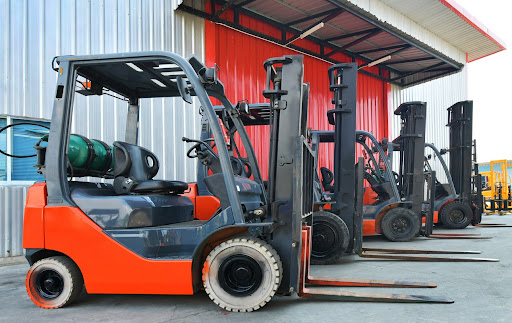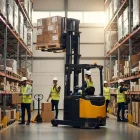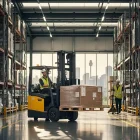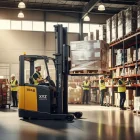Navigating the world of forklift hire in Sydney can be a daunting task. With a myriad of options available, making the right choice requires careful consideration.
This guide aims to simplify the process. It provides a comprehensive overview of the key aspects of forklift hire.
From understanding the benefits of hiring a forklift to choosing the right dealer, we’ve got you covered. We’ll delve into the types of forklifts available for hire and the factors to consider when making your selection.
Whether you’re a warehouse manager, a construction site supervisor, or a small business owner, this guide is for you. It’s designed to help you make an informed decision that suits your specific needs.
So, let’s get started. Welcome to your essential guide to forklift hire in Sydney.
Understanding Forklift Hire
Hiring a forklift in Sydney is an appealing option for many businesses. It presents a flexible, cost-effective solution for handling materials.
By hiring, you avoid hefty upfront costs associated with buying new equipment. This allows companies to allocate resources to other critical areas.
Many businesses in diverse sectors rely on forklift rental services. Sydney provides an extensive range of hire options to meet various industry needs. Whether for short-term use or ongoing projects, renting forklifts can streamline operations and enhance efficiency.
Benefits of Hiring Forklifts
Renting forklifts offers numerous advantages to businesses. Not only does it reduce financial burdens, but it also provides flexibility.
Key benefits include:
- Cost-effectiveness compared to purchasing equipment.
- Access to a variety of models and types.
- Maintenance and repair services included in the rental.
Additionally, renting forklifts aligns with temporary needs, avoiding long-term commitments. It allows businesses to scale operations during peak times without excessive investment.
Hiring forklifts also means having access to the latest technology. This ensures your operations are not hindered by outdated machinery.
Types of Forklifts Available for Hire
Sydney’s forklift rental market offers various options to suit different applications. Selecting the right type is crucial for operational success.
Common types include:
- Electric forklifts: Ideal for indoor use, they are environmentally friendly and quiet.
- Diesel forklifts: Suitable for outdoor environments and heavy lifting.
- LPG forklifts: Offer a balance for both indoor and outdoor use.
Additionally, specialised models like telehandlers and rough terrain forklifts cater to specific industry requirements. Each type serves distinct purposes, ensuring you have the optimal equipment for your job.
Understanding these differences aids in selecting the most suitable forklift. This guarantees efficiency and safety in your operations.
Factors to Consider When Hiring a Forklift
Choosing the right forklift involves evaluating several key factors. Each influences overall efficiency and safety.
First, assess the specific needs of your project. Consider what tasks the forklift will perform.
Evaluate the environment in which it will operate. Indoor versus outdoor settings can dictate the type of forklift needed.
Important considerations include:
- Load capacity and lift height.
- Safety features and ergonomic design.
- Rental terms and potential hidden costs.
Check the forklift’s tire type and suitability for your operational surface. This affects both performance and safety.
Verify the history and condition of the forklift. This ensures reliability and minimises downtime.
Understanding these factors helps in making a well-informed decision. It simplifies the process of hiring the most suitable equipment.
Load Capacity and Lift Height
Load capacity is a crucial factor when hiring a forklift. It determines the weight your forklift can handle safely.
Lift height is equally important. It should match the vertical needs of your operation. Ensuring these specifications align with your requirements is vital for efficient material handling.
Safety and Operator Comfort
Prioritising safety is essential when hiring forklifts. Look for models with updated safety features to minimise risks.
Operator comfort also plays a significant role. A comfortable operator is a productive one, which boosts overall efficiency.
Rental Terms and Additional Costs
When arranging forklift hire, clarify rental terms upfront. Terms dictate how long you can use the equipment.
Be aware of additional costs. Consider delivery fees, maintenance expenses, and potential penalties. Transparent understanding prevents unexpected charges during the rental period.
Choosing the Right Forklift Dealer or Rental Service
Selecting the right dealer or rental service is crucial. It directly impacts your forklift hire experience. Start by researching potential companies.
Look for those with a strong track record in the industry. This often indicates reliability and commitment to quality. A dealer should provide well-maintained equipment, ensuring minimal disruption during operations.
Consider the variety of forklifts available in their fleet. A wide selection allows you to find the best fit for your needs. Ensure they offer comprehensive customer support, which includes maintenance and emergency services.
Check if they are members of industry associations. This often signals adherence to high service and safety standards.
Reputation and Reliability
A dealer’s reputation is a testament to their service quality. Examine customer reviews and testimonials. Positive feedback usually indicates reliable service.
It’s wise to choose a dealer known for punctual delivery and responsive support. This assurance helps keep your project on track without unexpected delays.
Flexible Hire Terms and Insurance Coverage
Flexible hire terms make a big difference. They allow you to adjust rental periods as project demands change.
Assess the insurance coverage offered with the rental. Comprehensive policies protect against potential liabilities. Confirm that their coverage is sufficient to safeguard your interests fully.
Tips for Selecting the Best Forklift for Your Needs
Choosing the ideal forklift involves several considerations. Start by analysing your operational requirements. Pinpoint the specific tasks and environments for the forklift.
Make an informed decision by evaluating available options. Consider factors like load capacity, lift height, and maneuverability. These are critical for ensuring efficient operation.
When selecting a forklift, prioritise safety and operator comfort. Reliable safety features and ergonomic designs enhance productivity.
Here’s a quick checklist to aid your selection:
- Evaluate load capacity and lift height needs.
- Assess the working environment and terrain type.
- Consider operator comfort and safety features.
- Review different forklift models and attachments.
- Ensure compliance with relevant safety standards.
Taking these steps can significantly improve efficiency. Furthermore, it reduces downtime associated with equipment issues.
Assessing Terrain and Working Environment
Understand the terrain and environment where the forklift will operate. This affects your choice of equipment. Rough terrain demands a tough forklift, like a rough terrain model.
Warehouse floors may require electric forklifts. Consider tire types as well. The right tires support smooth movement and prevent damage.
Comparing Quotes and Reading Reviews
Always compare quotes from multiple providers. This practice ensures you receive the best deal.
Beyond cost, delve into customer feedback. Reviews provide insights into the service quality of a provider. Select a company praised for reliability and professionalism.
Additional Services and Considerations
When hiring forklifts in Sydney, consider additional services that may be offered. Many companies provide operator training, which can be crucial for safety. On-site support is another valuable service, minimising potential downtime.
Review the rental agreements for hidden costs. Maintenance fees and delivery charges can add up. Opt for companies with transparent pricing to avoid surprises.
Evaluate the availability of attachments and accessories. These can increase a forklift’s versatility, optimising your operations.
Here’s a checklist of potential services and considerations:
- Operator training programs
- On-site support and emergency repair services
- Transparent pricing structures
- Availability of attachments and accessories
Taking advantage of these services can enhance operational efficiency. Moreover, it ensures smooth project execution.
Operator Training and On-Site Support
Operator training is crucial. Many rental companies offer certified programs. Trained operators enhance safety and performance.
On-site support is another asset. This service ensures swift troubleshooting and repairs. It reduces downtime, keeping your projects on track.
Environmental Impact and Advanced Technology
Environmental impact is an important consideration. Some firms offer eco-friendly forklift options. Electric models reduce emissions and are often quieter.
Advanced technology, like telematics systems, offers significant benefits. These systems provide real-time data tracking. They help improve efficiency and safety.
Conclusion: Making an Informed Decision
Hiring a forklift in Sydney requires careful consideration. Evaluate your specific needs and compare options to ensure you’re making the best choice.
By understanding the available services and benefits, you can make an informed decision. This approach will optimise your operations and enhance productivity.




